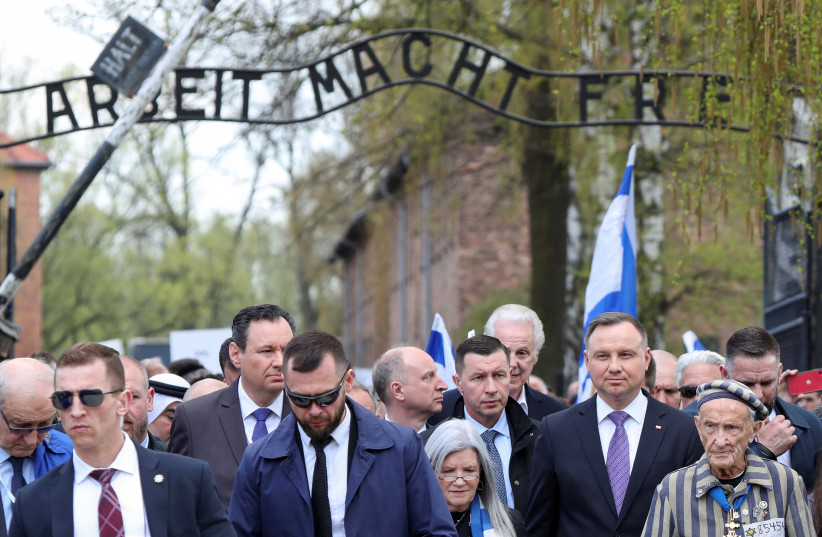KRAKOW — At the sound of a shofar blast, the March of the Living began.
A silence fell over the 3,000 people joining the trek from the gates of Auschwitz to the memorial ceremony ground in Birkenau, a silence broken by the soft crunching of footsteps.
The skies were overcast, but it didn’t rain — the clouds hung over the marchers grimly, as did the great concern that occupied much of the speeches at the March of the Living ceremony: 2022 may be the last year that Holocaust survivors are able to participate in the march. Only eight survivors attended the ceremony on Thursday.
Speakers such as Eitan Neishlos, himself a third-generation survivor, spoke of the passing of the torch.
Holocaust survivors needed to know that their story would live on: Holocaust survivor Edward Mossberg, 96, implored the Arab-Israeli youth movement Atidna to “tell the people I lost my whole family — cousins, uncles, parents, siblings — everyone was killed by the Germans.”

The marchers on Thursday were in high spirits as they walked, ready to bear the burden and the responsibility.
“They will never forget, and we will never forget,” said Nobuki Sugihara, son of Chiune Sugihara, the Japanese Righteous Among the Nations who saved thousands of Jews during the Holocaust. “We were here four years ago, and were shocked and happy to see so many young people, and now after corona, it’s starting up again,” he said.
Sugihara was optimistic about the progress of keeping the memory alive through education, as there was so much more research and study being done now than in his generation. However, he also warned against over-dramatization of history, as he said was done with his father’s story.
“The truth is amazing enough and doesn’t need to be embellished,” said Esin Sugihara, Nobuki’s wife. However, she also cautioned that “there’s a lot of work that needs to be done to educate. We need to continue to talk and speak about it [the Holocaust].”
Seven of the eight survivors attending were from the UK. “We always believed passing the torch is important, but because there are fewer survivors, it’s more important than ever,” said March of the Living UK head Scott Saunders. “As memory fades to history, Holocaust denial and those wishing to change history will increase. Our organization and others will keep the memory alive, and make sure the stories are not kept at the back of the history book.”
A member of Noar Yerushalayim from Israel said: “We need to remember. If we don’t, no one will.”
Tali, another Israeli youth, said “this is our responsibility.” She said her school had a project in which they recorded the stories of Holocaust survivors.
Hungarian March of the Living also brought high schoolers, one of whom said they feel they have a responsibility now because they have knowledge, and that “the responsibility is getting greater for those who know what happened here, so that it never happens again.”
Those ready to bear the torch draw strength from new communities seeking to keep the memory alive.
“Visiting Israel I learned a lot [about the Holocaust] but being here is a more in-depth experience — and I think I can share that experience with social media,” said Fatema Al Harbi, a Bahraini author and peace activist with the Sharaka delegation.
The NGO Sharaka’s delegation had representatives hailing from Lebanon, Palestinian Territories, Bahrain, Jordan, Syria, Morocco, Saudi Arabia and Turkey. Some of them received death threats, but still came.
Neishlos lit one of the torches of remembrance with the UAE’s Ahmed Obaid Al Mansoori, in honor of the new bonds that were being formed in the fight against hatred. Al Mansoori opened the first Holocaust exhibition in the Islamic world.
“We will overcome the darkness of the past,” he said in his speech, which was translated by Suleiman Suleiman, Atidna youth movement head. “This generation will stop this from ever happening again, we choose life.”
The dwindling of Holocaust survivor participation in the march was not the only pall over the event, as next door to Poland, Ukrainians were fleeing the ongoing Russian invasion.
The marchers were “under the dark shadow of the war in Ukraine, with immense human suffering,” said an organizer.
Polish President Andrzej Duda decried the Russian invasion, and implored the crowd not to turn a blind eye to the lessons of ‘Never again’ nor to the suffering of Ukrainians, about two million of whom now reside in his country as refugees.
A delegation of Ukrainian refugees was present at the ceremony.
To this challenge, the next generation also seemed ready. Almost every delegation bore Ukrainian flags, or wore pins of solidarity with Ukraine.
March of the Living began the event with a dedication to the victims of violence in Ukraine.
The 3,000 marchers from 25 nations, speaking different languages, waving different flags, came together, March of the Living chairwoman Phyllis Greenberg Heidman said, “only speaking one language: the language of memory.”
Together, as the delegations listened, the language was spoken as each ceremony speaker finished their speech with the promise: “Never again.”